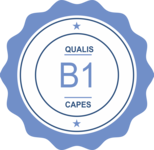ARTIFICIAL INTELLIGENCE (AI) PROGRAMS: limits in the legal field.
DOI:
https://doi.org/10.25247/2764-8907.2023.v2n3.p20-32Keywords:
Legal activities, Computer programs, Artificial intelligence in the legal field, Communicative theory of lawAbstract
The paper shows the importance of taking precautions against attitudes that are in favor of pointing out that the professional activities of judges, lawyers and legal professionals in general, may be carried out / exercised directly or indirectly by the very operation of Information and Communication Technologies (ICTs). This is because the assistance to juridical activities in relation to legal texts (interpretation, application, creation of rules, creation of dogmas and access to the same texts) must be regulated precisely. The reflection is necessary because there are several proposals that apparently contradict this idea; this is the case of the development of "AI programmes" that carry out professional legal activities, since their possible application constitutes a threat to the functioning of the rule of law, as their possible implementation constitutes a threat to the functioning of the rule of law.
Downloads
References
ALVES DA SILVA, P. Limites e possibilidades das ferramentas de inteligen̂cia artificial (IA) no poder judiciário. XI Encontro Internacional do Conpedi Chile – Santiago. Direito, governança e novas tecnologias I. Florianópolis: CONPEDI, 2022: p. 98-116.
CARBONELL, M. Funcionalidad de la Constitución y derechos sociales: esbozo de algunos problemas. Estudios Constitucionales, 2008; 6 (2): p. 43-71.
ENGISCH, K. Sentido y alcance de la sistemática jurídica. Anuario de Filosofía del Derecho, 1996; p. 7-41.
EHRLICH, E., Freie Rechtsfindung und freie Rechtswissenschaft (1903). Aalen: Scientia Verlag, 1987.
ESSER, J. Grundsatz und Norm in der richterlichen Fortbildung des Privatrechts. Tübingen: Mohr, 1956.
FERRAZ, T. Introdução ao estudo do direito: técnica, decisão, dominação. São Paulo: Atlas, 2003.
FREITAS, J. Sustentabilidade: direito ao futuro. Belo Horizonte: Editora Fórum, 2019.
GADAMER, H. Verdad y Método. Fundamentos de una hermenéutica filosófica. Salamanca: Ediciones Sígueme; 1977.
GALINDO, F. El acceso a textos jurídicos. Introducción práctica a la Filosofía del Derecho. Zaragoza: Mira, 1993.
HABERMAS, J. Theorie des kommunikativen Handelns. Volumen I. Frankfurt/M: Suhrkamp, 1981. HABERMAS, J. En la espiral de la tecnocracia. Madrid: Trotta, 2016.
MATURANA, H. VARELA, F. El árbol del conocimiento. Santiago de Chile: OEA/Editorial Universitaria, 1984.
MONTESQUIEU, C. L'Esprit des Lois et la querelle de l'esprit des lois. En: MONTESQUIEU, C. Oeuvres complètes. París: Ed. du Seuil, 1964.
PERELMAN, CH; OLBRECHTS TYTECA, L. Tratado de la argumentación. La nueva retórica. Madrid: Gredos, 1989.
REALE, M. Filosofia do direito. São Paulo: Editora Saraiva, 2002.
ROBLES, G. Cinco estudios de teoría comunicacional del derecho. Santiago de Chile: Ediciones Olejnik, 2018.
ROBLES, G. Teoría del derecho. Fundamentos de teoría comunicacional del derecho. Volumen III. Navarra: Aranzadi, 2021.
VIEHWEG, T. Tópica y Jurisprudencia. Madrid: Taurus, 1964. ZIPPELIUS, R. Rechtsphilosophie. München: Beck, 1994.
Downloads
Published
Issue
Section
License
Copyright (c) 2023 Fernando Galindo

This work is licensed under a Creative Commons Attribution 4.0 International License.
Autores que publicam nesta revista concordam com os seguintes termos:
- Autores mantêm os direitos autorais e concedem a Direito, Processo e Cidadania o direito de primeira publicação, com o trabalho simultaneamente licenciado sob a Licença Creative Commons Attribution que permite o compartilhamento do trabalho com reconhecimento da autoria e publicação inicial nesta Revista.
- Autores têm autorização para assumir contratos adicionais separadamente, para distribuição não-exclusiva da versão do trabalho publicada nesta revista (ex.: publicar em repositório institucional ou como capítulo de livro), desde que reconheça e indique a autoria e a publicação inicial nesta Revista.
- Autores têm permissão e são estimulados a publicar e distribuir seu trabalho online (ex.: em repositórios institucionais ou na sua página pessoal) a qualquer momento depois da conclusão de todo processo editorial, já que isso pode gerar alterações produtivas, bem como aumentar o impacto e a citação do trabalho publicado (Veja O Efeito do Acesso Livre).























